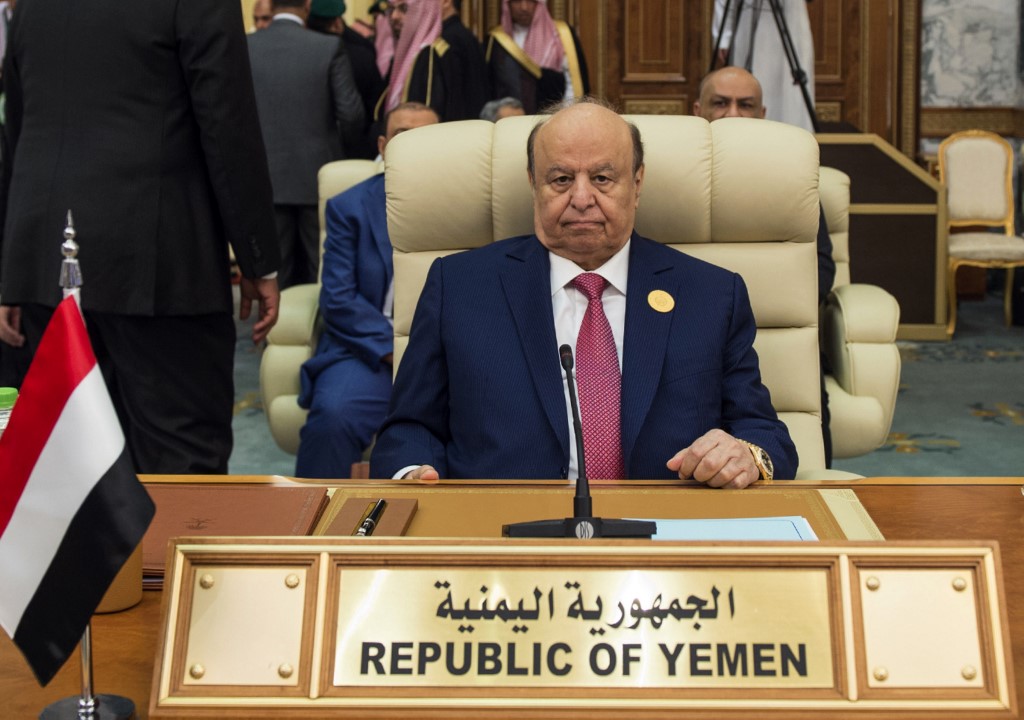Yemen 'peace' deal is a fragile truce between Saudi Arabia and the UAE
31 October 2019 12:24 UTC
To establish real peace and stability in Yemen, international actors should curtail the involvement of Riyadh and Abu Dhabi

UAE-trained Yemeni fighters patrol near the southern town of Zinjibar on 2 September (AFP)
ASaudi-brokered deal to merge the Yemeni government of Abd Rabbuh Mansour Hadi and the separatist Southern Transitional Council (STC) into a unity regime has raised hopes that peace in the war-torn country is on the horizon.
Yet this “deal” is really an opportunity for external powers to shore up their own influence in the country, given that the two Yemeni factions have received divergent support from Saudi Arabia and the UAE respectively.
The STC launched a coup in Aden in August, seizing the temporary southern capital from government control. STC-aligned forces then took on government forces in other southern provinces, sparking what was thought to be a new episode in Yemen’s war. Its militias gradually advanced across the south amid extensive Emirati support.
Strategic alliance
Yet, determined to preserve their own strategic regional alliance, Riyadh and Abu Dhabi have pushed for unity between these rival factions. The UAE again withdrew some forces after Saudi troops arrived in Aden earlier this month to reclaim the city.
Though this has alleviated Saudi-UAE divisions over Yemen, in pursuit of its own geopolitical ambitions, Riyadh has temporarily regained an upper hand. It has re-empowered its favoured political actor, Hadi, while securing ties with the increasingly prominent STC, which attended the peace talks in Riyadh.
Meanwhile, Abu Dhabi must contend with Hadi’s presence, which it had tried to undermine with its secessionist ambitions.
The unification deal ignores Yemen's dire security and stability situation
Rather than seeking to improve Yemen's stability, Saudi Arabia supports Hadi - who is based in Riyadh - as he gives the kingdom legitimacy to intervene in the country’s politics.
This has been Riyadh’s long-term strategy in Yemen, rather than the official goal of fighting the Houthis.
Saudi Arabia has pursued a “soft power” strategy, politicising aid and investment to re-establish its traditional influence over its southern neighbour and make it dependent on Riyadh’s control. Its vehicle for this has been the Saudi Development and Reconstruction Program for Yemen, which is pursuing dozens of “development” projects across Hadi-controlled regions.
Yet, these measures are a tool for consolidating Riyadh’s own links to Yemen. Saudi Arabia had deliberately targeted Yemeni infrastructure, food sources, agricultural centres and marketplaces under Houthi control, to weaken the faction’s prominence. This shows that it does not prioritise a strong Yemeni state, but rather supports a weakened Yemen that it can easily control.
Increasingly illegitimate
Though Hadi is the UN-recognised president, he is considered increasingly illegitimate throughout Yemeni society, particularly as he has been absent in Riyadh for more than four years. He has thus been unable to provide adequate security and services for Yemen. Saudi Arabia has still attempted to shore him up in the country, supporting his return to a parliamentary session in Sayun in April.
The STC coup initially threatened such influence, particularly as the group was primarily backed by the UAE. Had a deal not been brokered, the STC could have seized control of much of the south.

Now Saudi Arabia seeks to appease the STC, aiming to reunite the government and separatists against Riyadh’s primary adversary in Yemen, the Houthis. Yet this risks triggering a further backlash in an already devastated country. The unification deal ignores Yemen’s dire security and stability situation.
As the Houthis expanded in September 2014, seizing the capital Sanaa and partly claiming to oppose corruption and external interference in Yemen, this deal - to which they are not a party - could provoke further antagonism from the group, particularly as it was brokered in Riyadh.
Even though the Houthis reportedly supported a ceasefire in September, this deal could reignite another conflict, while it ostensibly seeks to halt the violence between the government and separatists.
Meanwhile, the STC has yet to renounce its calls for southern independence, viewing the deal as an opportunity to secure greater southern autonomy, particularly as its terms are vague. Saudi Arabia will have to contend with this. Riyadh would likely oppose the STC’s wish for more southern independence, as it could shore up the Houthis in the north.
Separatist backlash
Not paying heed to the STC’s wishes and imposing Hadi’s vision for the country could trigger another separatist backlash, as tensions persist between the two sides. The deal is therefore only a temporary solution, with Riyadh desperately aiming to avoid losing its influence in Yemen.
Saudi Arabia is playing a dangerous game. Yemen’s ministers of interior and transport survived an assassination attempt hours after the peace deal was finalised. While no one claimed responsibility, it shows there is still opposition to the Saudi-backed government of Hadi.
Thus, while Saudi Arabia is temporarily back in the driver’s seat, it will still face obstacles to its political goals in the country, including the UAE’s own interests.
While the peace deal and the empowerment of Hadi hinders Abu Dhabi’s ambitions, it could still use the STC to push for greater southern autonomy.
Having “withdrawn” from Yemen while later continuing its interventions, the UAE could still seek to impose its will on the south and control its strategic ports. For now, it is once again operating more pragmatically to preserve its “peacemaker” image and its alliance with Saudi Arabia. While this continues, there will still be subtle jostling between these two powers.
International actors should curtail the involvement of these two powers to establish real peace and stability in Yemen. Yemen’s vast humanitarian crisis remains a more urgent issue; the civilians are the real victims of such power struggles.
The views expressed in this article belong to the author and do not necessarily reflect the editorial policy of Middle East Eye.


0 Comments:
Post a Comment
Subscribe to Post Comments [Atom]
<< Home